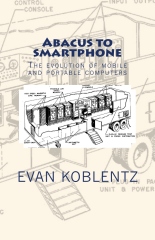

Home
Excerpts
Author
FAQ
Reviews
Media
Errata
(Would you like to review my book or submit public comments? Please send an email to info@abacustosmartphone.com. All queries are appreciated.)
Liz Petrick, Ph.D. (for IEEE Annals of the History of Computing): "This is a rather different kind of book... It is self-published, slim, makes prominent use of personal correspondence with the author, and is intended to appeal to computer enthusiasts as much as historians. It also describes examples of computer technology that have rarely, if ever, been discussed in academic histories. These are the understudied machines that were, to varying degrees, portable and the companies that were determined to make mobility a factor in how computers were used. The book traces this history from military truck computers of the mid-twentieth century to research into miniaturization to the phase of "luggables" -- suitcase-sized computers of the 1980s, to pocket computers, PDAs, and the smartphones and tablets of today. Throughout, tangential technologies and false starts are also mentioned, and pages of photographs of mobile computer technology are included. The book suggests many avenues of future research for historians interested in these technologies. Koblentz does not state his historical themes explicitly, beyond the goal of understanding the evolution of portability and how developers built upon previous technologies and ideas. There is a lack of historical context behind each of the machine examples, but there are also a number of loose themes that repeat throughout the story. The author highlights the importance of patents in providing a way for innovators to disseminate their ideas to others and a resource for historians to understand failed attempts to commercialize new technologies that nonetheless offer evidence for a lineage of specific technological features. Koblentz uses science fiction in a similar fashion, as a way of tracing how ideas of portability existed in fiction before they could be made real, going so far as to include the entirety of a charming marketing short story from 1979 titled "Thank you, Beep...!" of the future vision of an HP tablet computer that functions as an indispensable personal assistant for a businessman trapped on an unexpected layover in Indonesia. Koblentz gives us a succinct examination of portability, tracing a feature, as opposed to the single company, person, or type of computer that is often chronicled ... recommended for historians of all stripes or those with an interest in wide-ranging narratives of computer technology.
Lee Felsenstein, engineer of the Osborne computer: This book presents the history of personal, portable computing from the abacus to the present day in a remarkably thorough, accessible fashion. Not only the winners are described but the also-rans and almost-made-its. Koblentz has done an admirable job of research and description in covering the field. I've always been careful to claim that my Osborne-1 design was only the "first commercially-successful portable computer" because I knew that a book like this would be forthcoming to show the timelines, descriptions and designers of earlier efforts. By nature a survey of the field, it is thoroughly researched and can provide pointers to more in-depth investigations.
Carl Sorensen, Librascope historian: This unique history book includes a good variety of innovative computer companies and their products that older engineers will remember, plus a few they probably never heard of. Most will conclude the book provides a good balance between completeness and brevity, which makes it an interesting fast read.
Allan Olley, computer historian: [T]he book demonstrates a compelling sense of the design and technical challenges for those who sought to make portable computing a reality. (Read more...)
I unpublished this book from Amazon. I hope to have a new version available soon. Thank you for your interest!

Contact the author:
info@abacustosmartphone.com


